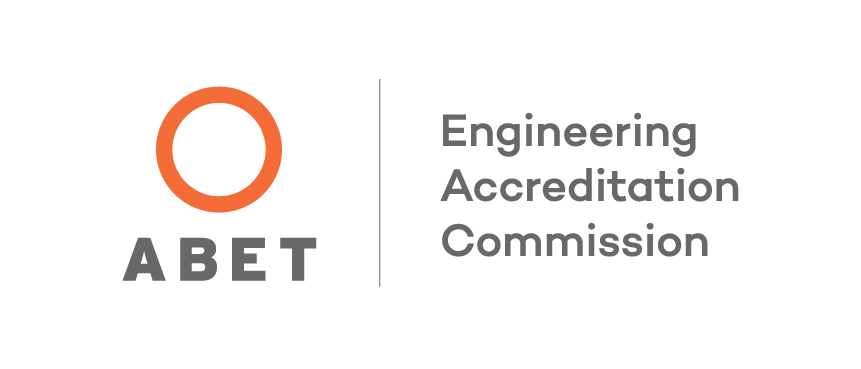Accreditation
The Engineering Management (B.S.) program is accredited by the Engineering Accreditation Commission of ABET, https://www.abet.org, under the commission's General Criteria for Engineering Management and Similarly Named Engineering Programs. The ABET accreditation process, a voluntary, non-governmental process of peer review, helps assure quality in educational programs. ABET-accredited educational programs must meet certain defined standards.
ABET contact information
http://www.abet.org
415 North Charles Street
Baltimore, MD 21201
410.347.7700

Department Mission
The mission statement of the Engineering Management Program is to: Equip individuals with expertise in engineering, management, innovation, and systems thinking to prepare them to be leaders in the identification and solution of technical and organizational problems that are complex and evolving.
Program Educational Objectives
Graduates of the Engineering Management Program will exhibit proficiency and excellence in the areas of management, finance, systems, communications, and professional behavior. Within these areas, graduates will exhibit the explicit skills and knowledge as detailed below.
Technical Knowledge and Analytical Problem Solving: Graduates of the Engineering Management Program will exhibit proficiency and excellence in management, finance, human resources, communications, and professional behavior. Within these areas of proficiency, graduates will exhibit the explicit knowledge and skills as detailed below.
- An understanding of the fundamental principles and concepts of engineering.
- A mastery of Engineering Management tools and techniques including those utilized in operations management, project management, optimization, management of technology, and supply chain management.
- Sound business judgment.
- Relevant analytical, computing and modeling tools such as statistics and simulation.
- Sound business judgment.
Finance: Graduates of the Engineering Management Program are responsible and financially aware managers and leaders who utilize finance, accounting, engineering economic analysis, modeling, and statistical methods to evaluate the financial statements, profitability, payback period, cost of capital, and financial risk of a company and its business opportunities in order to maximize the company’s return, capital structure, and valuation.
Human Capital Management: Graduates of the Engineering Management Program are prepared to assume roles as leaders who can successfully develop and leverage the performance potential of teams and individuals in the workplace. They have experience and competencies in such areas as:
-
- Assessing and understanding their own personal strengths and weaknesses as well as those of others
- Principles of effective leadership with diverse constituents and environments.
- Building and empowering teams and individuals through coaching and mentoring.
- Managing individual and team performance to achieve organizational objectives.
- Effectively implementing data-driven, evidence-based, rational decision-making processes
- Principles of conflict resolution
- Principles of human factors applied to work systems design
- Principles of safety systems.
- Managing in an ethically responsible manner while appropriately addressing social and cultural aspects of the workplace and the organizational environment.
Communication: Graduates of the Engineering Management Program engage others through effective oral, technical, and written communications evidenced by:
- Working collaboratively and cooperatively with multiple stakeholders to effect positive outcomes.
- An ability to adjust written content and presentation style to varied audience types.
- Clear and concise communication skills both informally and formally. Confidence and discernment in asking appropriate questions to obtain information vital to the project or task at hand.
Professional Behavior: Graduates of the Engineering Management Program will continually grow in their awareness and understanding of the societal, ethical, cultural, legal, and political issues prevalent in an increasingly global society.
Integration: Drawing on systems thinking proficiencies in the areas described above, graduates of the Engineering Management Program are able to integrate their skills and knowledge to:
- Effectively manage people, talent, time and financial resources.
- Develop successful marketing strategies and business plans.
- Develop plans for projects and programs.
- Analyze problems, consider alternatives, and implement solutions.
Engineering Management Student Outcomes
Engineering Management graduates will have the ability to:
- Identify, formulate, and solve complex engineering problems by applying principles of engineering, science, and mathematics.
- Apply engineering design to produce solutions that meet specified needs with consideration of public health, safety, and welfare, as well as global, cultural, social, environmental, and economic factors.
- Communicate effectively with a range of audiences.
- Recognize ethical and professional responsibilities in engineering situations and make informed judgments, which must consider the impact of engineering solutions in global, economic, environmental, and societal contexts.
- Function effectively on a team whose members together provide leadership, create a collaborative and inclusive environment, establish goals, plan tasks, and meet objectives.
- Develop and conduct appropriate experimentation, analyze and interpret data, and use engineering judgment to draw conclusions.
- Acquire and apply new knowledge as needed, using appropriate learning strategies.
Engineering Management Program Enrollment and Graduation Data:
| Year | 2019 | 2020 | 2021 | 2022 | 2023 |
| Undergraduate Enrollment | 203 | 194 | 194 | 159 | 194 |
| Year | 2018-19 | 2019-20 | 2020-21 | 2021-22 | 2022-23 |
| Bachelors Degrees Awarded | 78 | 83 | 79 | 73 | 61 |
*Graduate number count by SS/FS/SP Academic year

Follow Engineering Management and Systems Engineering